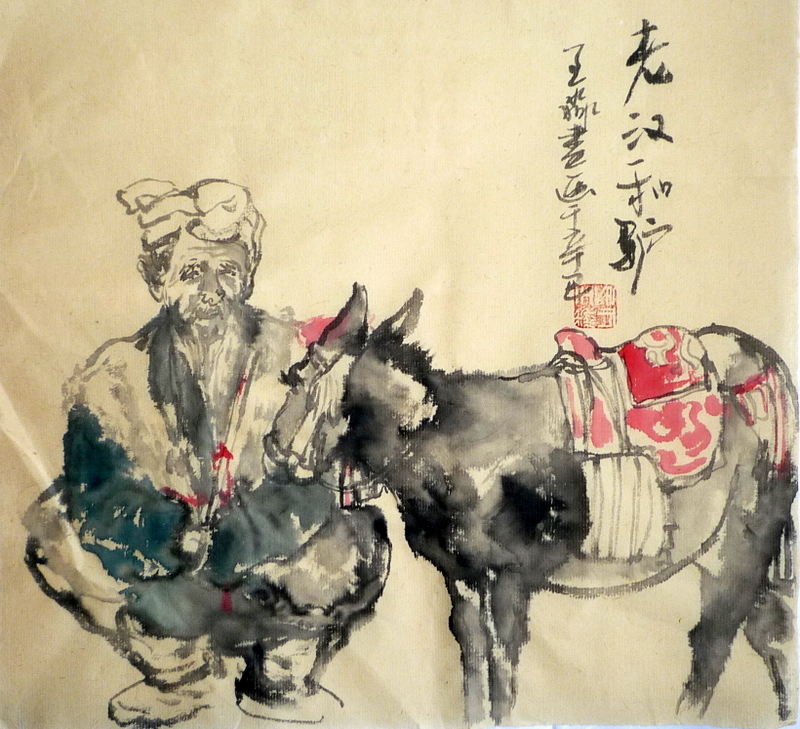I do not know enough about Asian culture. I shall introduce myself to it in the best way I can think of, which is through poetry and perhaps a piece of art to accompany it at the end.
Niu Qingguo is this week's writer, the poem, 'The Old Donkey'. I wish I could appreciate the poem in its original form but alas I am not learned in the language. English shall have to suffice.
She is old, the donkey who plowed our field year after year.
The first revelation came the day she knelt on her front legs
and the cart was pushed uphill by Father
with every thread of his strength.
That evening, Father embraced the donkey’s skinny legs
like a man circling his arm around an old friend's shoulders.
He said, “We are old, you and I.”
Now, the donkey seemed to know she served no purpose
and lost interest in water and hay.
The ragged coat she had worn for a lifetime
showed a bald scar, the size of a hand.
I told Father to take her to the market,
but they always came back together
like a young couple, forced by parents to divorce,
leaving home at dawn and returning together timidly at dusk.
The other day, I stepped outside
and saw the donkey, chin on the fence;
she beckoned me with a trembling voice, so bleak and so sad,
but Father said he knew what she meant to say.
For the benefit of anyone who does know the language, here is the link so you can enjoy the original:
http://modernchinesepoetry.com/poems.php#niu_qingguo
What is different about this poem compared to the others I have covered so far is the central focus; the pastoral scene is set so well that the poem comes to speak of life and death, not only of the donkey but of the humans as well.
From the offset, the poem is made timeless. The donkey 'is' old in the present tense but she 'plowed' in the past. This gives the indication of retirement, creating pathos as the man is old too (he had to use all his 'strength', with 'thread' giving connotations of a struggle which was near to failure) but cannot retire himself, especially as he is now without his helper.
The pathos is enhanced with the direct speech given to the 'Father'. Addressing her as 'we', the personal pronoun creates unity, separating the pair from the son, who watches on with youthful eyes, as the reader probably does too. His sympathy cannot be converted to empathy yet but we all have the knowledge that this will probably be us one day too and it will have happened to someone we know. So the line between sympathy and empathy is blurred.
The image of the 'bald scar, the size of a hand' links endophorically with the man putting his arm around the donkey. The connection between the human and the animal is so strong that it has created an impression on the latter.
The connection forces the son to move out of his role and take on that of the Father by telling him to 'take her to the market'. This role reversal is intriguing as the boy does not seem to be so intrinsically invested in the donkey. Maybe this is because he realises that the two men would not survive without one person detached and therefore focused.
This leads onto an exophoric reference; where is the mother in this household? She is not mentioned, even as absent. One reading is that the donkey replaces her emotional role in the text. She is depicted as part of a 'divorce' but of a 'young couple', perhaps showing what the old man lacks (both youth and a partner). The actual use of the plural noun 'parents' causes pain in the reader as it highlights the fact that the use for this boy should be singular.
With regards to the last words, or rather the fact that the donkey's are not given, I do not know what to conclude, other than the fact that the bond between the donkey and the man is proven so strong that it does not matter. Maybe the point is that he did not truly know what 'she meant to say' (notice that the personification could be literally read as if she were the mother) but he did not need to know because whatever she wanted to say would have been enough; she was trying to strengthen the bond through speech and that was the most he could gain from the relationship, especially now that she can no longer work.
I shall have to content myself, as with many poems and stories, with the knowledge that I shall have no more knowledge. The paradox of the scholar...

No comments:
Post a Comment